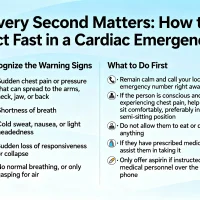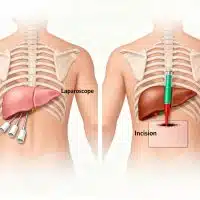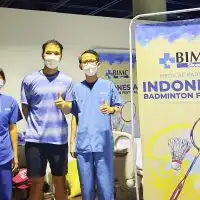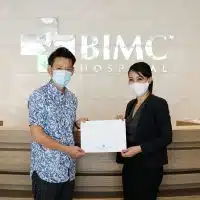
Close-up Of A Doctor’s Hand Checking Blood Pressure Of A Patient
The mere size of a grain of rice, the carotid body, located between two major arteries of the neck that supply the brain with blood, has recently been discovered to control blood pressure.
Clinical scientists at the University of Bristol found a new way to treat high blood pressure in their research “Unilateral carotid body resection in resistant hypertension: a safety and feasibility trial.”
Led by Professor Julian Paton at the University of Bristol and Dr. Angus Nightingale at the Bristol Heart Institute, their paper was published in the Journal of American College of Cardiology. The research points out that the carotid bodies are a possible cause of high blood pressure and with this understanding offer a new approach to treatment.
The research further indicates that removing one carotid body from some patients with high blood pressure caused an immediate and sustained fall in blood pressure. “The reduction in blood pressure we have seen are impressive — more than you would see with pharmacological medication — and demonstrate the exciting potential there now is for targeting the carotid body to treat hypertension,” said Dr. Nightingale.
The carotid bodies detect levels of oxygen in blood and when this falls they tell the body there is a possible emergency and signal the brain to increase breathing and blood pressure.
“Treating the carotid body is a novel approach and a potential game changer as we believe we are reducing one of the main causes for hypertension in many patients. High blood pressure treatment typically tackles the symptoms targeting the end organs such as the heart, kidneys and blood vessels, and not the causes,” said Professor Paton.
“Most importantly, we have developed some unique tests to assess which patients have overactive carotid bodies,” said Dr. Nightingale. “This now gives us a way to personalize treatment, which is essential as there are multiple reasons why high blood pressure develops.”
The clinical trial demonstrated that the carotid bodies in patients who responded to resection had raised carotid body activity. These patients breathed more at rest and produced exaggerated breathing responses when the oxygen level in their blood was lowered.
“Although this surgical approach to controlling high blood pressure was successful, we don’t think this will be the solution in the long term. We now need to find a drug that dampens down an overactive carotid body and resets the blood pressure thermostat to a normal level,” said Dr. Nightingale.
Professor Paton believes this breakthrough will lead to the first novel anti-hypertensive treatment strategy in more than 15 years and can effectively reduce blood pressure in patients with resistant hypertension.
High Blood Pressure Quick Facts
- A very common medical condition effecting about 1 in 5 people
- By the time you reach 55 to 65 years of age, you will have about a 40% chance of having high blood pressure
- When you are 55 to 65 years of age, you will have a 90% chance of developing it in the next 20 years
- Ideal blood pressure reading is 140/90. If you have diabetes, your target would be less than 130/80
- If you do not treat or control your high blood pressure, you will be at an increased risk of stroke, heart attack, blood vessel disease, and heart failure
- High blood pressure may run in your family. Know your family medical history so you can have your blood pressure checked regularly
- Eat a healthy diet that is low in sodium. Get regular exercise. Limit your intake of alcohol and caffeine. Lose weight if you are overweight. And if you smoke, quit
- Experts estimate that about 30% of all high blood pressure is caused by consuming too much salt
Do you have questions about high blood pressure? Come speak with a BIMC doctor today.
Health-e reporting along with sources: Daily Express; Economic Times; innovateli.com; Telegraph; Science Daily; Health canoe











